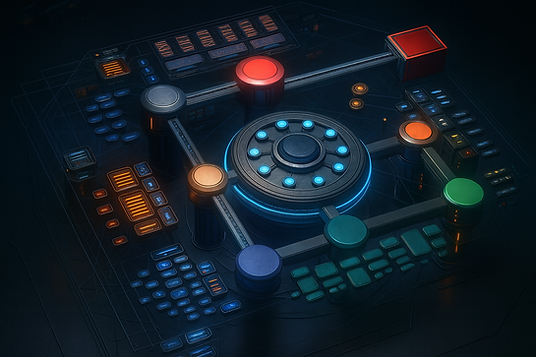DcGn®
Our Core Project
Our Vision
Why We Created It
We created DcGn® because we saw an urgent and growing gap between the speed of technology and the depth of human reflection. Decisions that once allowed for thought, conversation, and context are now often made or heavily influenced by systems built for speed, prediction, and profit.
We saw how modern decision-making is increasingly driven by speed, prediction, and hidden influence often leaving little room for ethics, reflection, or genuine choice. We wanted to create something that protects critical thinking and restores the space for human values in decisions that matter.
Out of this recognition came a clear purpose: to design a decision-making environment that slows the pace, restores perspective, and makes space for moral reasoning without oversimplifying complex realities. A framework that protects cognitive autonomy, clarifies moral ambiguity, and detects manipulation before it shapes behaviour.
DcGn® is our response to this need, a system built not to control choices, but to help people make them with clarity, responsibility, and awareness.


What DcGn® Is
DcGn® is not predictive AI and it’s not a chatbot. It is a moral intelligence framework, a structured, multi-layered reasoning system that guides individuals and institutions through ethical, reflective, and autonomous decision-making. It works by combining moral philosophy, cultural perspectives, cognitive psychology, and transparent logic flows into a single decision-support process. Each decision route is explainable, traceable, and aligned with ethical principles, so users can understand not just what to do, but why that path is recommended.
Rather than replace human judgment, DcGn® strengthens it, helping people slow down in moments of complexity, examine their values, apply discernment, and make choices that reflect both personal and collective responsibility. It also serves as an ethical counterweight to AI black-box systems, restoring transparency, accountability, and moral coherence in environments where automated processes increasingly influence outcomes.
What It Aims to Do
Modern decision-making whether personal or institutional, is increasingly shaped by systems that prioritise speed, efficiency, and prediction over reflection, ethics, and human values.
People are under increasing pressure to make decisions in an era where disinformation and manipulation often masquerade as freedom of choice. But that freedom can come at a cost: the erosion of critical thinking and a growing dependence on technology to do the thinking for us.
Many digital systems subtly shape our thinking through opaque algorithms, emotional triggers, and subtle interface prompts and habit-shaping techniques, often steering choices without our full awareness.
This creates four urgent challenges:
• Cognitive overload – Too much information, too quickly, leading to reactive decisions instead of thoughtful ones.
• Moral ambiguity – A lack of ethical guidance in everyday decision environments, especially for younger generations.
• Loss of autonomy – Invisible algorithmic systems that influence behaviour without transparency or consent.
• Diminished trust – Uncertainty over whether institutions or tools act in people’s best interests.
The Response
DcGn® is designed as a different kind of decision-support system:
Not to give people the “right answer,” but to guide them through an ethical, reflective, and structured process of choosing well.
It helps individuals and organisations:
• Make decisions that are ethically grounded, and efficient.
• Clarify their values and apply them in difficult situations.
• Recognise manipulation, bias, or contradiction from data, systems, or social pressure.
• Strengthen internal reasoning when facing dilemmas involving cultural, emotional, or moral complexity.
• Slow down fast thinking, offering a guided path through complexity without oversimplifying it.
Whether in the hands of:
• Individuals – making sense of conflicting pressures or values.
• Educators – building ethical literacy and decision-making confidence.
• Institutions – aligning governance and policy with ethical principles.
DcGn®’s ultimate aim is to ensure that human decisions, especially those shaped or supported by AI, remain accountable to human values.


Public Interest & Democratic Contexts
DcGn® is designed as a moral intelligence framework that supports ethical, transparent, and reflective decision-making in complex and high-stakes environments. It is particularly suited to contexts where decisions carry consequences beyond the individual and require justification, accountability, and the ability to be explained to others.
In environments such as governance, public services, education, and civic institutions, DcGn® helps surface ethical considerations, clarify trade-offs, and make reasoning processes visible and open to examination. By supporting explainable decision pathways and human oversight, the system contributes to public trust, cognitive autonomy, and responsible decision-making in settings where legitimacy, accountability, and public confidence are essential.
Where We Are Now
DcGn® is currently in its prototype development phase. The core architecture has been build, a multi-layered system integrating moral philosophy, symbolic reasoning, cognitive psychology, and ethical decision-mapping. Its structure is grounded in principles designed for a time when decisions are shaped as much by algorithmic influence as by human intention.
Our next steps are to:
• Expand the logic engine with broader cultural and ethical datasets.
• Test decision routes in real-world educational and civic contexts.
• Collaborate with developers, ethicists, and cultural partners to refine the user experience.
We are seeking partners, funders, and collaborators who share our vision for ethical technology, people who understand that the future of decision-making must be transparent, value-driven, and accountable to the people it serves.